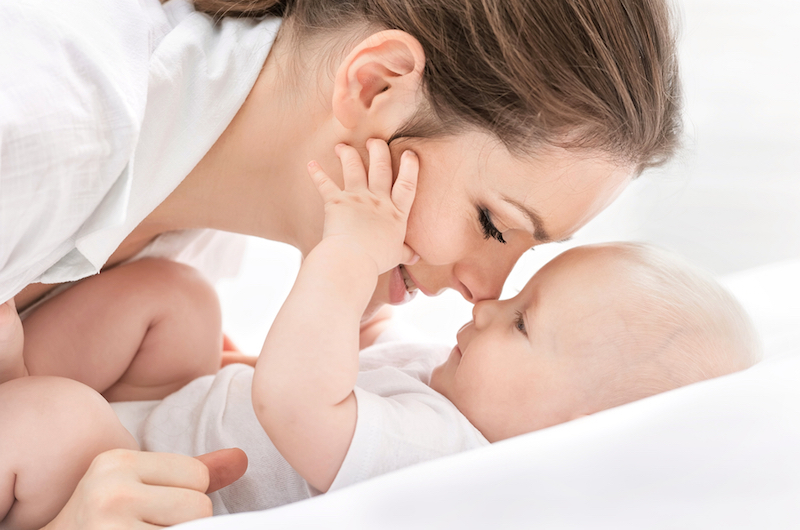'Science of Mom': Author Sifts Through Childrearing Facts & Fictions

Some new moms might feel as if they need to be scientists to understand what's best for their babies: Vaccinate on schedule or not? Breast-feed exclusively or allow for some bottle-feeding? Sink $20 into one of those CDs promising to turn my baby into a genius?
Now, a new book aims to help parents made such decisions. Alice Callahan, who earned a Ph.D. in nutritional biology and went to do research on fetal physiology before she had her first child in 2010, decided to tackle motherhood in a way that was most natural to her: as a scientist.
The book, called Science of Mom, grew out of her blog of the same name, and is being published this month by Johns Hopkins University Press. Callahan said that she wanted to help parents wade through sometimes helpful, but often dubious information online.
"I think a solid understanding of science can be a sort of armor that can protect you in the wilds of the Internet," she told Live Science.
Up until a few generations ago, most moms had a local community to turn to for advice — namely, their own mothers, aunts or close neighbors. Maybe it wasn't always the best advice, but it was informed by culture and likely wasn't tainted with a vehement or threatening tone. [10 Scientific Tips for Raising Happy Kids]
Not so today, as such close communities seem to have all but disappeared in this hectic modern world. Many mothers are choosing to have babies later in life and may not have living or healthy mothers or aunts to confide in. Some live thousands of miles from where they grew up.
And so, many mothers turn to books and the Internet for advice…and, there, they quickly encounter the "mommy wars," where countless, faceless others will ridicule their innocent question about whether it is OK to feed a 5-month-old baby a slice of banana.
Get the world’s most fascinating discoveries delivered straight to your inbox.
How can a mom make confident and prudent decisions amid all the shouting and quack advice? How can she discern between hype and evidence?
When Callahan became pregnant, she was working as a postdoctoral fellow at the University of Arizona. The scientific method was engrained in her head.
Like many new moms, Callahan had questions: Where should her daughter sleep? When could she start her on solid foods? How crucial is it to exclusively breast-feed?
Yet unlike most new moms, Callahan knew how to interpret the latest scientific data on childrearing and, more important, how to weed through the ubiquitous bad advice. Her experience led her to create a blog,
"If you look for [parental advice] online, you can easily fall down a rabbit hole of misinformation or conspiracy theories, or get sucked into judgmental arguments that don't help anyone," Callahan told Live Science. "I see a lot of misuse of science in online parenting forums and websites, where people cherry-pick studies or completely misinterpret them for the purpose of confirming what they want to believe."
As such, Callahan cuts to the chase in the first chapter in her book, subtitled "A crash course in evidence-based parenting." She explains how to search for and interpret original studies, as opposed to relying on the often incomplete or incorrect news reports and Web postings of those same studies.
For example, she explains that although animal and cell-based studies can be insightful to scientists, they generally are used to pave the way toward more refined studies and ultimately human studies; they are of little use to answering parenting questions, Callahan explains.
More valuable would be systematic reviews and controlled studies of people. These are what inform health authorities on important topics such as when to cut the umbilical cord (about a minute or two after delivery, in most cases) or how to place your baby to sleep (on his back, to minimize the risk of sudden infant death syndrome, or SIDS).
Less valuable, if not completely useless, are anecdotes and testimonials, Callahan said. And these tend to serve as a basis for many Internet sites and articles railing against established nutrition advice or immunizations. A predominance of testimonials on a site is a red flag for bad advice, Callahan said.
"I took every opportunity to illustrate examples of important concepts for understanding science: why one study isn't that meaningful on its own; differences between correlation and causation; how science builds over time; limitations of different study designs; etc.," Callahan said. "Those are concepts that are useful no matter what question you tackle."
Callahan's new book covers a baby's first year and includes discussions on injections, eye goop, newborn screening tests, breast-feeding, sleeping, nutrition and vaccines. She takes a compassionate, non-preachy approach with a goal of not telling the reader what to do but rather how to seek wise advice and make smart decisions…and to enjoy having a baby, which is what it is all about, she said.
As her daughter, Cee, now approaches age 5, Callahan's quest for answers hasn't stopped. She has a lot of blogging and book writing ahead of her, she joked.
Follow Christopher Wanjek @wanjek for daily tweets on health and science with a humorous edge. Wanjek is the author of "Food at Work" and "Bad Medicine." His column, Bad Medicine, appears regularly on Live Science.

Christopher Wanjek is a Live Science contributor and a health and science writer. He is the author of three science books: Spacefarers (2020), Food at Work (2005) and Bad Medicine (2003). His "Food at Work" book and project, concerning workers' health, safety and productivity, was commissioned by the U.N.'s International Labor Organization. For Live Science, Christopher covers public health, nutrition and biology, and he has written extensively for The Washington Post and Sky & Telescope among others, as well as for the NASA Goddard Space Flight Center, where he was a senior writer. Christopher holds a Master of Health degree from Harvard School of Public Health and a degree in journalism from Temple University.
 Live Science Plus
Live Science Plus





